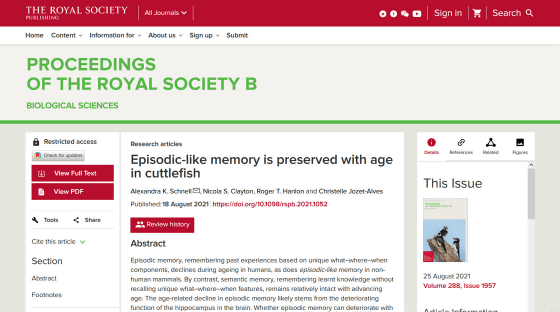It turns out that squids do not lose their ability to remember 'when, where, and what kind of food they ate' even as they age.

by
Memories of events that you have experienced are called 'episodic memory ' and are accompanied by time, place, and emotions at that time. It is known that episodic memory ability in humans declines with age, but a new study on squids shows that squids have the ability to remember events such as 'when, where, and what kind of food they ate.' However, it turned out that it did not decline with aging.
Episodic-like memory is preserved with age in cuttlefish | Proceedings of the Royal Society B: Biological Sciences
https://royalsocietypublishing.org/doi/10.1098/rspb.2021.1052

Cuttlefish retain sharp memory of specific ev | EurekAlert!
https://www.eurekalert.org/news-releases/925467
Cuttlefish remember the what, when, and where of meals—even into old age | Ars Technica
https://arstechnica.com/science/2021/08/cuttlefish-remember-the-what-when-and-where-of-meals-even-into-old-age/
Whether or not a particular creature has episodic memory requires confirmation of 'evidence of consciously remembering a particular event,' but episodic memory cannot be confirmed in non-speaking animals. Therefore, it was unclear whether animals had episodic memory for a long time, but it seems to be episodic memory in magpies , apes , rats , zebra fish, etc., starting with the confirmation of episodic memory in California scrub jay in 1998. It was confirmed that I had something. Researchers call these memories 'episodic memories' because animals cannot explain episodes verbally.
Episodic memory has also been confirmed in squids , and it is known that future foraging behavior can be optimized from past foraging behavior. In humans, episodic memory is formed by the hippocampus , so episodic memory also declines as hippocampus function declines with age. On the other hand, the hippocampus does not exist in the squid, but the brain structure called 'vertical leaf' is responsible for memory and learning, and the vertical leaf does not decline until 2 to 3 days before the squid dies due to aging.

by Kamiel Kempeneers
So a research team led by Dr. Alexandra Schnell of the University of Cambridge conducted an experiment to see if squid's episodic memory is affected by aging. Biologist Schnell is a person who has been studying squid for a long time, and also announced the research result that 'squid has a self-control to put up with food that he does not like so much to get his favorite food.'
The research team 24 animals of the order of the experimental common cuttlefish prepared, was half of them are young age 10-12 months squid, the other half from 22 to 24 months old squid. Since the lifespan of squid is about 24 months, it seems that the group of 22 to 24 months is equivalent to humans in their 90s.
First, the research team shook the black and white flags at two points in the aquarium and trained the squid to react to the flags. Then, after 1 hour at the place where there was a specific flag, we trained to set up food that squid does not like so much, and at the place where there was another flag, after 3 hours, we trained to set up food that squid likes, and gave it to squid. I taught 'when, where, and what kind of food can I get?' Since the place where each flag appears was different each time, the squid had to look at the color of the flag and decide what kind of food would appear at what time passed.
After four weeks of training, we tested how well the squids retained their training memories, and found that all squids, young and old, regardless of age, were in the location of a particular flag. It turned out that I remember the time when the food appeared and the type of food. This is the first evidence that squids are age-independent with respect to episodic memories of certain events.

by Grass Foundation
The researchers suspect that the episodic memory of squid is unaffected by aging because the vertical leaves do not decline until a few days before death. 'We speculate that this ability will help remember which individual the wild squid mated with, so it will not mate again with the same partner. These behaviors are widespread living in the same area. It may promote the spread of genes to individuals. '
Related Posts:







